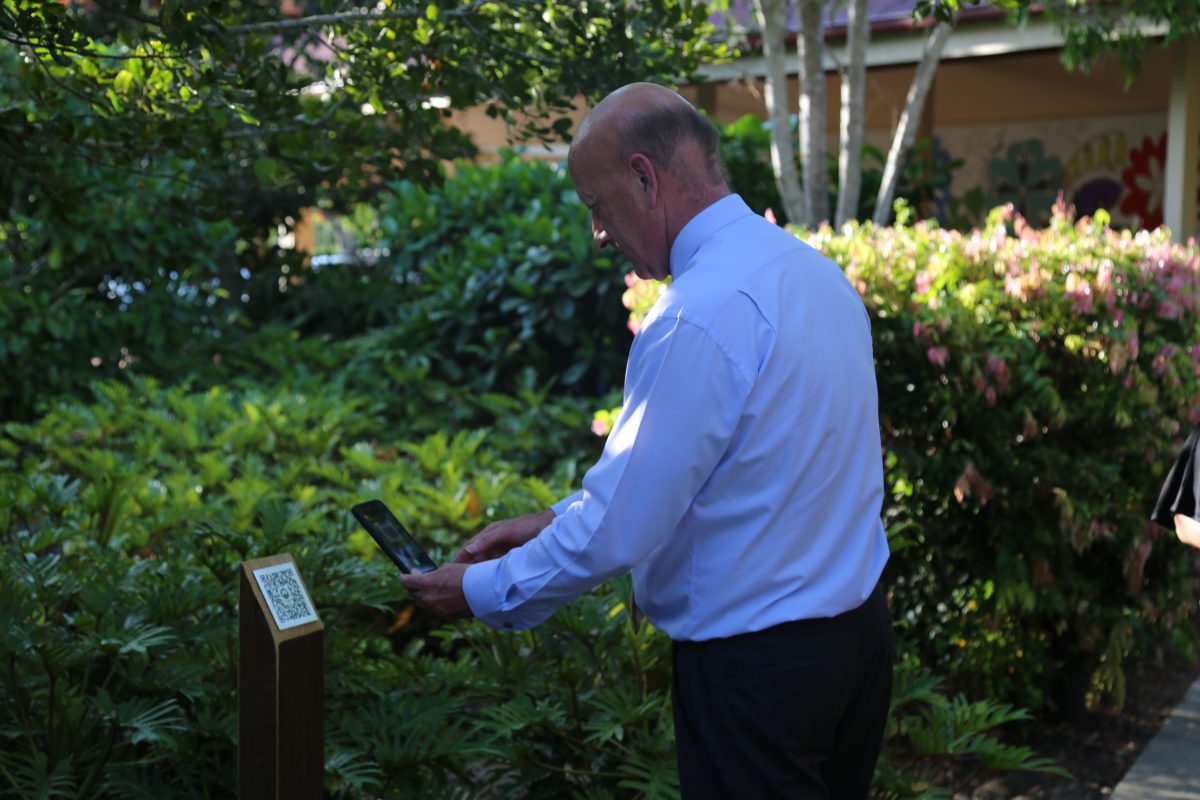The Matthew Flinders Eco Experience
Posted: 04 November 2020

Overview
The Flinders Eco Experience at Matthew Flinders Anglican College invites visitors to explore the school’s rain forest-fringed campus via a self-guided walk that links nature with technology. The Eco Experience weaves a one kilometre path through the 22-hectare College campus and enables visitors to use their mobile device, such as a mobile phone or iPad, to explore and experience the flora and fauna along the way.
Details
The Eco Experience weaves a one kilometre path through the 22-hectare College campus and invites visitors to use their mobile device, such as a mobile phone or iPad, to explore and experience the flora and fauna along the way. Known as ‘tree caching’, the technology enables users to scan their mobile devices over the QR Codes (that look like black and white bar codes) placed at key points along the path. Once the QR code is scanned at the base of a tree, for example, the scan directs the user to a website, video or other digital source to learn more about that tree, and interesting facts about that tree species.
The technology is simple:
- Use the Flinders Eco Experience map available on the homepage to locate the trail.
- Choose where to start your walk, either at Tree 1 or anywhere along the trail
- Locate the QR code on the tree
- Scan the QR code using the camera app on your device* or a QR code reader that you have installed prior
- A page of information for that tree will appear – read the information about the tree and enjoy the photo gallery.
- Move to the next tree and scan the next QR code….
- Tree caching is a cost-effective way to support and encourage people to explore the outdoors while learning about native wildlife and environmental sustainability.
The Flinders Eco Experience was created as a whole-of-College collaboration, including the Flinders Capital Works Manager, Mr Rocco Perugini and students and staff of the Environment Club, Science Club and IT departments, as well as some parents. Mentors from the local community included Tracey McMahon, Plant Research Technician Genecology Research Centre and Dr Rob Lamont, Conservation Geneticist and Molecular Ecologist, both from the University of the Sunshine Coast. Flinders teacher Sheree Bell, who facilitates the Flinders Environment Club, says visitors will discover that there are 40 species of birds in addition to possums, kangaroos and other marsupials who also frequent the local area.
The walk incorporates both native and exotic species. Some of the trees are mature and quite tall, with orchids and vines scattered through them. They provide fruits attracting birds and other fauna. If you look carefully you may see some nesting boxes attached to a tree; a home provided by our students.
The creek has permanent water in some areas and a large catchment, so it runs in some sections all year round. Forty species of bird have been identified with possums, kangaroos and other marsupials also frequenting the area. The occasional freshwater turtle pops up to say hello. There are many macro-invertebrates like snails and small fish in the creek visible from the bridges.
The trail is approximately 1km long and includes two bridges, two outdoor classrooms and multiple seated areas. It starts at the Quarterdeck Cafe meandering through the Secondary School, bordering the Anthony Vincent oval, and crosses the creek to the Flinders Early Learning Centre. Continuing further, it borders the Forrester Field and returns through the Primary School to finish in the Main Car Park, at the aptly named, Flindersia Australis (Crows Ash).
Challenges
The school’s WiFi is not accessible along parts of the walk, so to allow everyone to fully enjoy the walk we provide a portable WiFi router to those who need it for the walk. This can be booked out in advance with the IT Department with instructions.
Impact
The benefits of this walk are numerous, including providing a resource for teaching and nature appreciation. Small bridges and seats provide collection points for classes undertaking field work or to simply sit and ponder nature. It is a source of inspiration for our artists and writers, as it provides a tranquil and relaxing setting for them to work.
There are numerous benefits for our students being able to reconnect with nature in this way.
A study on the cognitive benefits of nature found that subjects who took a nature walk did better on a memory test. Nature walks and other outdoor activities build attention and focus. There are pieces of evidence that indicate strong environmental connections to be related to better performance, heightened concentration, and reduced chances of developing Attention Deficit Disorder. Research has also shown that people suffering from mild to major depressive disorders showed significant mood up-liftments when exposed to nature. A study has found that spending more time outdoors and less time with our electronic devices can increase our problem-solving skills and improve creative abilities.
Advice
- Ensure you have enough time committed to the project, the Flinders Eco Experience took us a year through to completion
- Consider hosting an official opening (afternoon cheese platter, drinks and photograph opportunity while demonstrating the process of how it works) with dignitaries (network of people who worked on this project) and all students/teachers involved
- Consider students with special needs ensuring access to the trees and the IT components when designing the walk
- Consider informing teaching staff of the project so they can use it with their classes
- Ensure you have a solid team of support. For this project we utilised the following personnel:
- Maintenance/Buildings & Grounds team (map of the school, contacts for timber posts, plaques etc and they provided the labour with full consideration of safety)
- A horticulturalist that knows the native and non-native flora in your region
- A website builder and your IT team (IT help secure a portable Wi-Fi)
- An enthusiastic team of student researchers (we united with our Senior Science club for this)
- A PR team and photographer to market, advertise and include the project on the school website
- A project co-ordinator (for us this was the Teacher in Charge of the Environment Club)
Author: Sheree Bell, Teacher in charge of the Environment Club and Marine Science/Science Teacher, Matthew Flinders Anglican College
